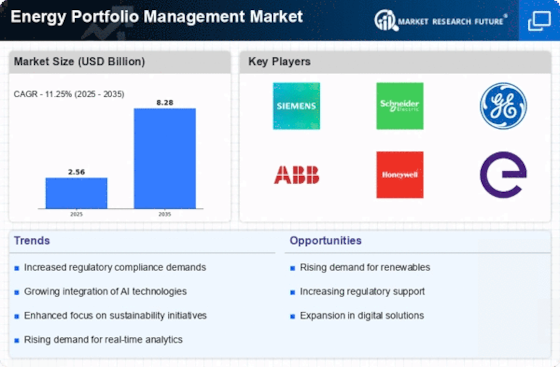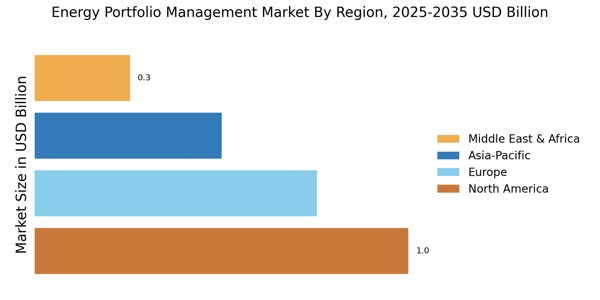Regulatory Support for Clean Energy
The Energy Portfolio Management Market is experiencing a surge in regulatory support aimed at promoting clean energy initiatives. Governments are implementing policies that incentivize the adoption of renewable energy sources, which is likely to drive demand for energy portfolio management solutions. For instance, mandates for renewable energy integration and emissions reduction targets are becoming more prevalent. This regulatory landscape encourages organizations to optimize their energy portfolios to comply with these requirements. As a result, the market for energy portfolio management is projected to grow, with estimates suggesting a compound annual growth rate of over 10% in the coming years. This growth is indicative of the increasing importance of regulatory frameworks in shaping the energy landscape.
Growing Demand for Energy Efficiency
The Energy Portfolio Management Market is witnessing a growing demand for energy efficiency solutions as organizations strive to reduce operational costs and environmental impact. Companies are increasingly recognizing the financial benefits of optimizing energy usage, which can lead to substantial cost savings. According to recent studies, organizations that implement energy management strategies can achieve energy savings of up to 30%. This trend is further fueled by rising energy prices and the need for sustainable practices. As a result, energy portfolio management solutions that focus on efficiency are becoming essential for businesses across various sectors. The market is expected to expand significantly, driven by this increasing emphasis on energy efficiency and sustainability.
Investment in Renewable Energy Projects
Investment in renewable energy projects is a key driver for the Energy Portfolio Management Market. As the world shifts towards sustainable energy sources, there is a notable increase in funding for solar, wind, and other renewable energy initiatives. This influx of investment is likely to create a demand for sophisticated energy portfolio management solutions that can effectively manage diverse energy assets. Reports indicate that investments in renewable energy are projected to reach over 1 trillion dollars annually by 2030. This trend underscores the necessity for organizations to adopt comprehensive energy portfolio management strategies to maximize returns on their renewable energy investments. Consequently, the market for energy portfolio management is poised for substantial growth as more entities seek to navigate this evolving landscape.
Technological Advancements in Energy Management
Technological advancements are playing a pivotal role in the Energy Portfolio Management Market. Innovations in energy management software and tools are enabling organizations to analyze and optimize their energy consumption more effectively. The integration of artificial intelligence and machine learning into energy management systems allows for predictive analytics, which can enhance decision-making processes. Furthermore, the rise of Internet of Things (IoT) devices facilitates real-time monitoring and data collection, providing valuable insights into energy usage patterns. This technological evolution is expected to propel the energy portfolio management market, with projections indicating a market size exceeding 5 billion dollars by 2026. Such advancements are crucial for organizations seeking to enhance their energy efficiency and sustainability.
Increased Focus on Sustainability and Corporate Responsibility
The Energy Portfolio Management Market is increasingly influenced by a heightened focus on sustainability and corporate responsibility. Organizations are under pressure from stakeholders to adopt environmentally friendly practices and demonstrate their commitment to sustainability. This shift is prompting companies to invest in energy portfolio management solutions that align with their sustainability goals. Research indicates that businesses prioritizing sustainability are likely to experience improved brand loyalty and customer satisfaction. As a result, the demand for energy portfolio management tools that facilitate sustainable energy practices is expected to rise. This trend not only reflects changing consumer preferences but also indicates a broader movement towards responsible energy consumption, further driving the growth of the energy portfolio management market.

















